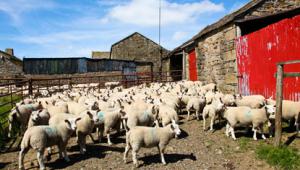In a report released today, the committee also revealed the government has incurred £642m in disallowance penalties from the European Union since 2005 for failing to pay subsidies effectively.
The CAP provides direct financial support to farmers primarily through the Basic Payment Scheme, which accounts for around 80% of total payments.
Delays implementing a suite of IT systems designed to help the government make payments was partly to blame for delays, MPs said. It meant that around a third of farmers (38%) received payments on the first day of the payment window on 1 December 2015. Two months later, 76% of farmers had received payments. But by the end of March, 14,300 (16%) of farmers had still not received any payments at all.
This “did not inspire confidence” in the government’s ability to cope with the future challenges posed by Brexit, the PAC said.
Responsibility for CAP implementation lies with the Department for Environment, Food and Rural Affairs, which pays out £1.8bn each year to farmers and landowners through the Rural Payments Agency.
Over 10,000 farmers who received a payment were not paid in full, requiring additional payments totaling £27.4m.
A lack of accurate land data was highlighted by the committee as one of the reasons for the delay. Also, the online application portal that farmers were supposed to use was not fully functional, which meant data had to be processed manually. This led to significant errors, the report found.
Moreover, the government has not done enough to assess the impact of late payments or mitigate their impact, MPs said. ‘Hardship’ payments had been unpopular, possibly due to the stigma attached to the name, which was later changed. Also, ‘bridging’ payments were made later than farmers expected.
The committee called on Whitehall to use better data and ensure “accurate, full payments are made in a timely manner” in the current payment period. Previous payment performance models needed to be restored, the report said. However, the fact that current RPA chief executive Mark Grimshaw was leaving at the end of February remained a key risk.
In the report, MPs raised “significant concerns” regarding the size of disallowance penalties imposed by the European Commission for non-compliance with the rules of the scheme. England has already incurred penalties of more than half a billion pounds, which was “far too high” and above those for nearly all other EU countries, MPs said.
PAC deputy chair Richard Bacon said the recent history of the Basic Payment Scheme was a “sorry affair”.
“Farmers have suffered badly from the collapse in service levels and government has done too little to help them cope with the fallout.”
Also, Bacon highlighted that taxpayers were footing the bill for government’s failure to deliver the scheme properly. He said: “Taxpayers continue to be hit in the pocket by financial penalties… running to more than half a billion pounds”.
He said “rapid and effective change” was required, and “if farmers are to be properly supported through Brexit” they must be supported at senior level.
Responding to the report, a Defra spokeswoman said the government was working to improve the system and ensure farmers get the support they are entitled to.
“We have made major progress – this year the Rural Payments Agency has already met its target to pay 93 per cent of farmers by March 2017, and it is working hard to get outstanding payments into bank accounts,” she added.
“We are leaving the European Union. This represents one of many opportunities to design a better system which supports farmers and our agricultural economy, and cut unnecessary red tape.”


















